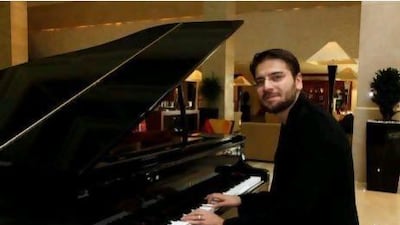It may look austere on first instance, but dig deeper into the evocative sounds and you will discover an eclectic and dynamic genre. In the fifth of our eight-part series Music of the Arab World, we take a look at Islamic music and its journey from what is now known as Saudi Arabia to the rest of the world.
Origins
Beginning in what is now Saudi Arabia during the time of the Prophet Mohammed, the genre began with a form called nasheed or anasheed, meaning chanting in Arabic. Anasheed were mostly sung a cappella or accompanied by percussion instruments, and were tributes to the spiritual life. These traditional songs are akin to the hymns or psalms used in Christianity.
As the faith spread globally, worshippers began using elements from their own musical traditions, including instruments, to sing their own songs of praise. This led to the growth of several new subgenres of Islamic music stretching across continents. Today's youth have also incorporated the latest styles, such as hip-hop and pop music, to craft their own modern odes to Islam.
The music
Islamic music was originally defined by what it didn't contain: no strings, brass, or wind instruments and no female vocals. The only instrument initially allowed was minimal percussion by an Arabic drum called the daf. This minimal form remains widely practised in the Gulf and some other parts of the Arab world.
However, in places such as Turkey and South-east Asia, several new styles of spiritual songs have developed. In Turkey, Sufi adherents incorporate music into worship. The most popular are services undertaken by Mevlevi Sufis, which include chanting and the famous whirling dervishes.
In Pakistan and South-east Asia, the most recognised form of devotional music is qawwali. Performed by up to nine men, a qawwali group would often use instruments such as the harmonium (a type of keyboard) and percussion instruments including a tabla and dholak.
The songs often run from 15 to 30 minutes and include instrumental preludes, repeated refrains and vocal improvisation. In recent times, nasheed artists from the Gulf have found innovative ways to overcome the no-instrument rule.
Albums by Sharjah's Ahmed Bukhatir and Kuwait's Mishary Rashid Al Afasy use studio trickery and manipulate backing vocals to sound like a synth piano or string section. In the West, groups such as America's Native Deen and Australia's The Brothahood use hip-hop music to get their spiritual message across to a new generation of young Muslims.
The nasheeds in English by South Africa's Zain Bhikha's secured him a large following in Europe and the Middle East.
The words
Keep it clean - that's the motto for this genre's musicians. Islamic music today is meant to offer a wholesome alternative to the salacious lyrics found in modern pop music.
Lyrics often focus on Islamic beliefs and history as well as current events. One of the oldest and most popular Islamic songs is the Arabic nasheed Tala'al Badru Alayna. The song dates back more than 1,400 years to what is now Medina in Saudi Arabia.
The nasheed was sung to celebrate the arrival of Prophet Mohammed to the city (then called Yathrib) to build the first Islamic community.
The nasheed has been covered by the likes of Yusuf Islam (formerly Cat Stevens) and the classic Egyptian songbird Umm Kulthum. Zain Bhikha's nasheeds, delivered in a voice eerily similar to Michael Jackson in ballad mode, often focus on keeping the faith through rough times. In the lilting Allah Knows he advises: "Every grain of sand, in every desert land, He knows. Every shade of palm, every closed hand, He knows."
The stars
The British artist Sami Yusuf is the genre's biggest name. With more than nine million albums sold and songs (both instrumental and percussive) delivered in English, Arabic, Farsi and Urdu, Yusuf has a truly global fan base, so much so that TIME magazine declared him "Islam's biggest rock star".
In the Gulf region, Ahmed Bukhatir is a big seller. His success, particularly in Europe, has seen him perform nasheeds in English and one in French. The late Pakistani qawwali singer Nusrat Fateh Ali Khan is renowned for bringing the form to international ears. With a startling six-octave voice, Khan's amazing range needs to be heard to be believed.
Detroit's popular Seven8Six are an interesting group, too. They perform English nasheeds in a boy-band style - think the Muslim version of Backstreet Boys.
The Playlist
Below are a few suggestions to begin your Islamic music collection:
A soulful – mostly Arabic – collection from the Emirati featuring his best English track Forgive Me, a song urging assistance to the disabled. Listen to samples from the album here.
Nusrat Fateh Ali Khan: Intoxicated Spirit (1996)
Nominated for a Grammy Award, the album finds Khan at his most dynamic, with qawwali compositions that are both ruminative and highly charged. Listen to samples from the album here.
In an attempt to appease both conservative and more liberal fans, Yusuf released the album with a "music" and "percussion" version. But it was his stirring voice that propelled the album to sell four million copies. Listen to samples from the album here.


